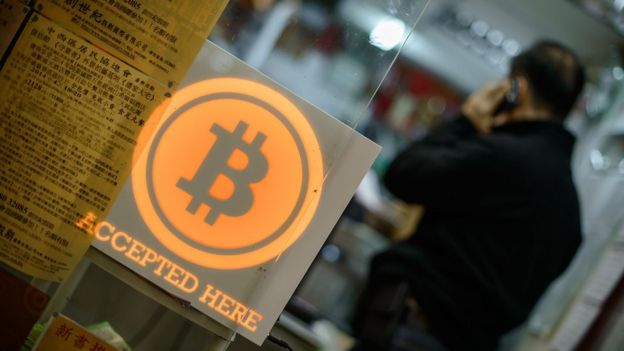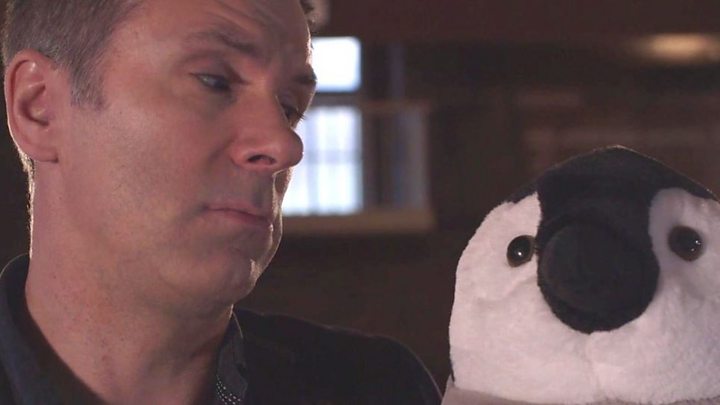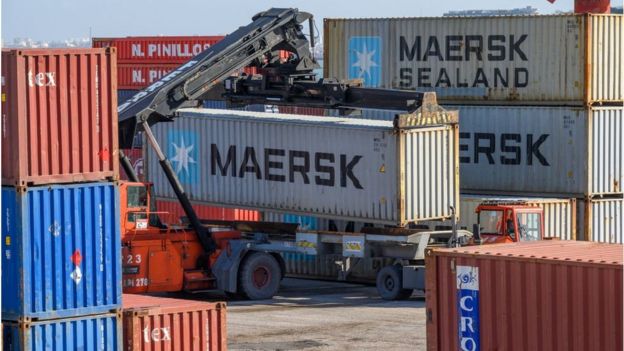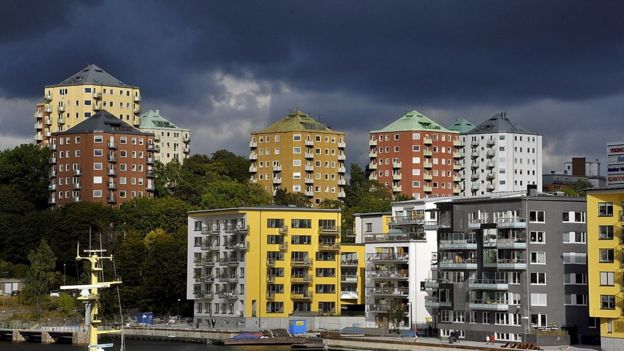Imagine you are out shopping and get to the till but your card doesn't work. It turns out that your bank has had a computer meltdown and none of its customers, including you, can pay for anything.
But what if the till had access to a record, or ledger, of the balance on your credit and debit cards that was updated anytime you bought something?Even with the bank's systems down your card would still work at the supermarket, because the till itself would know your balance.
That is just one possibility offered by a distributed ledger, also referred to as a blockchain. The technology has been around for more than a decade and has been heavily hyped.It sounds pretty handy, but in practice, it is hardly used. So what happened?

Image copyright
GETTY IMAGES
Image caption
Cryptocurrency Bitcoin is perhaps the best-known use of blockchainBlockchain has struggled to find a purpose, beyond powering cryptocurrencies like Bitcoin.
In that scenario, the blockchain acts as a universal record of every Bitcoin transaction ever made. The blockchain is a ledger, or log, of those transactions and users on the network collaborate to verify new transactions when they occur.
They're rewarded financially for this effort - an enterprise known as "Bitcoin mining".But the basic idea, of a ledger of information distributed around lots of different users instead of held centrally, has provoked a lot of interest.

Media captionBitcoin explained: How do crypto-currencies work?
Proponents have long argued it could be a better alternative to traditional databases.But how transformative would blockchain-style alternatives really be?
The shop tills example was suggested by Dave Birch, an author and advisor on digital financial services, who has been critical of some proposed blockchain schemes in the past."I'm prepared to buy that," he says, of the tills idea. "I think there's some value to it."
 More Technology of Business
More Technology of Business
There are other ideas out there. Prof Gilbert Fridgen, a financial services expert at Luxembourg University suggests a distributed ledger system that keeps track of certificates and degrees issued by universities.
No one organisation would be responsible for it. Rather, copies of the ledger would be held by multiple parties and individuals would be able to check that records of their own qualifications were accurate.It would certainly by useful.
In 2018, a BBC investigation showed that there were thousands of fake degrees in circulation, so a decentralised system that tracks qualifications might appeal to employers.
That said, Prof Fridgen notes that nothing about a blockchain itself can stop some corrupt individuals trying to add fraudulent information to it. Additional checks are needed.If those trust issues can be solved, then blockchains could have real benefits.
News surfaced recently of members of the Windrush generation of migrants from the Commonwealth who have had their legal status questioned because records were not kept of their being granted leave to remain in the 1970s.
In the future, such errors might be avoided by keeping information like this on a distributed ledger instead of relying on the government to look after it.
Some big businesses have been incorporating the technology into their operations.

Image copyright
GETTY IMAGES
Image caption
Maersk tracks paperwork for goods using blockchain technologyTake shipping giant Maersk. It uses blockchain technology in TradeLens, a new system for tracking customs documentation on goods that are shipped internationally.
The idea is that any stakeholder in the process, from a port to a customs authority, can quickly look up details pertaining to a shipment.
Maersk says that 10 million shipping events are now registered in the system every week.
Unlike Bitcoin, TradeLens uses a permissioned blockchain, this is a non-public ledger to which access is controlled.
But a similar system could be achieved with other technologies such as cloud-based ledger databases that encrypt data and control who can access what information.
Another project of interest is the real estate system trialled by the Swedish land registry, Lantmäteriet.
A blockchain was designed to track documents during the sale of a property. The buyer and seller, brokers and banks involved could all take part in and keep track of the sale digitally.
 Image copyright
Image copyright
GETTY IMAGES
Image caption
Sweden's land registry experimented with blockchainWhile the trial proved such a scheme was possible, a change in legislation would be needed before the system could be scaled up in the future, explains Mats Snäll, chief innovation officer at the Swedish land registry.
"It was never integrated into the production system of the land registry," he tells the BBC.
In Thailand, cryptocurrency firm Zcoin developed a blockchain-based system so that members of the Thai Democrat Party could cast digital votes for their new leader in late 2018.
Instead of having to trust a central authority to count the votes, they were instead collected on the Zcoin blockchain.Votes were made at polling stations or via a mobile app, where voters needed to submit a photo of themselves when casting their ballot.
These digital votes were also audited by the election committee, a Zcoin spokesman tells the BBC. Zcoin says it is planning to announce a bigger scheme, involving "millions" of voters, in the near future.These are thought-provoking ventures, though a debate remains as to whether blockchain is absolutely necessary for any of them.
Some say that eventually blockchain-style systems will prove to be the most efficient option for organising data at scale. Entrepreneur Helen Disney is one of them."In many cases there is a cost saving to be made once you've got past the initial hurdle - obviously bringing in any new system is expensive," she says.
While blockchain bluster will surely continue, even sceptics like Mr Birch think there are some focused applications that could prove worthwhile. So far, blockchain might not have changed the world - but it has got a lot of people thinking.
But what if the till had access to a record, or ledger, of the balance on your credit and debit cards that was updated anytime you bought something?Even with the bank's systems down your card would still work at the supermarket, because the till itself would know your balance.
That is just one possibility offered by a distributed ledger, also referred to as a blockchain. The technology has been around for more than a decade and has been heavily hyped.It sounds pretty handy, but in practice, it is hardly used. So what happened?

Image copyright
GETTY IMAGES
Image caption
Cryptocurrency Bitcoin is perhaps the best-known use of blockchainBlockchain has struggled to find a purpose, beyond powering cryptocurrencies like Bitcoin.
In that scenario, the blockchain acts as a universal record of every Bitcoin transaction ever made. The blockchain is a ledger, or log, of those transactions and users on the network collaborate to verify new transactions when they occur.
They're rewarded financially for this effort - an enterprise known as "Bitcoin mining".But the basic idea, of a ledger of information distributed around lots of different users instead of held centrally, has provoked a lot of interest.

Media captionBitcoin explained: How do crypto-currencies work?
Proponents have long argued it could be a better alternative to traditional databases.But how transformative would blockchain-style alternatives really be?
The shop tills example was suggested by Dave Birch, an author and advisor on digital financial services, who has been critical of some proposed blockchain schemes in the past."I'm prepared to buy that," he says, of the tills idea. "I think there's some value to it."
 More Technology of Business
More Technology of Business- What happens to all the old wind turbines?
- How tech is helping catch rats, wasps and bedbugs
- What can you use instead of Google and Facebook?
- Robot tanks: On patrol but not allowed to shoot
- Giant jet engines aim to make our flying greener

There are other ideas out there. Prof Gilbert Fridgen, a financial services expert at Luxembourg University suggests a distributed ledger system that keeps track of certificates and degrees issued by universities.
No one organisation would be responsible for it. Rather, copies of the ledger would be held by multiple parties and individuals would be able to check that records of their own qualifications were accurate.It would certainly by useful.
In 2018, a BBC investigation showed that there were thousands of fake degrees in circulation, so a decentralised system that tracks qualifications might appeal to employers.
That said, Prof Fridgen notes that nothing about a blockchain itself can stop some corrupt individuals trying to add fraudulent information to it. Additional checks are needed.If those trust issues can be solved, then blockchains could have real benefits.
News surfaced recently of members of the Windrush generation of migrants from the Commonwealth who have had their legal status questioned because records were not kept of their being granted leave to remain in the 1970s.
In the future, such errors might be avoided by keeping information like this on a distributed ledger instead of relying on the government to look after it.
Some big businesses have been incorporating the technology into their operations.

Image copyright
GETTY IMAGES
Image caption
Maersk tracks paperwork for goods using blockchain technologyTake shipping giant Maersk. It uses blockchain technology in TradeLens, a new system for tracking customs documentation on goods that are shipped internationally.
The idea is that any stakeholder in the process, from a port to a customs authority, can quickly look up details pertaining to a shipment.
Maersk says that 10 million shipping events are now registered in the system every week.
Unlike Bitcoin, TradeLens uses a permissioned blockchain, this is a non-public ledger to which access is controlled.
But a similar system could be achieved with other technologies such as cloud-based ledger databases that encrypt data and control who can access what information.
Another project of interest is the real estate system trialled by the Swedish land registry, Lantmäteriet.
A blockchain was designed to track documents during the sale of a property. The buyer and seller, brokers and banks involved could all take part in and keep track of the sale digitally.
 Image copyright
Image copyrightGETTY IMAGES
Image caption
Sweden's land registry experimented with blockchainWhile the trial proved such a scheme was possible, a change in legislation would be needed before the system could be scaled up in the future, explains Mats Snäll, chief innovation officer at the Swedish land registry.
"It was never integrated into the production system of the land registry," he tells the BBC.
In Thailand, cryptocurrency firm Zcoin developed a blockchain-based system so that members of the Thai Democrat Party could cast digital votes for their new leader in late 2018.
Instead of having to trust a central authority to count the votes, they were instead collected on the Zcoin blockchain.Votes were made at polling stations or via a mobile app, where voters needed to submit a photo of themselves when casting their ballot.
These digital votes were also audited by the election committee, a Zcoin spokesman tells the BBC. Zcoin says it is planning to announce a bigger scheme, involving "millions" of voters, in the near future.These are thought-provoking ventures, though a debate remains as to whether blockchain is absolutely necessary for any of them.
Some say that eventually blockchain-style systems will prove to be the most efficient option for organising data at scale. Entrepreneur Helen Disney is one of them."In many cases there is a cost saving to be made once you've got past the initial hurdle - obviously bringing in any new system is expensive," she says.
While blockchain bluster will surely continue, even sceptics like Mr Birch think there are some focused applications that could prove worthwhile. So far, blockchain might not have changed the world - but it has got a lot of people thinking.
-
- 1
Francisco Gimeno - BC Analyst The blockchain technology has already passed its hype stage. Now realism and honest/sane scepticism puts it in its real space at this time. The tech is sound, the use cases are there, many in finch have embraced it. We believe blockchain implementation all around is already happening, but, as with other revolutionary techs global use needs time to growth at global scale.







